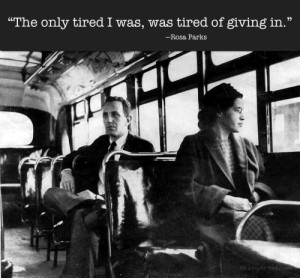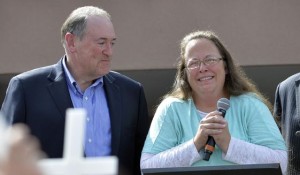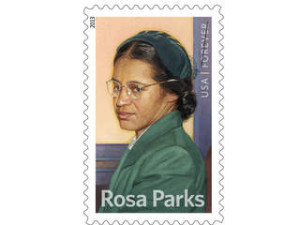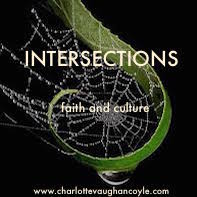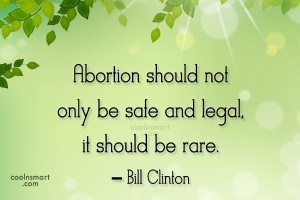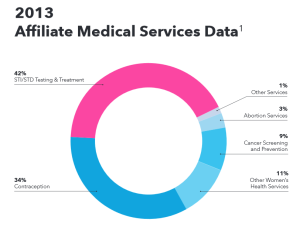A few years ago, during a movie marathon weekend, I watched "The Long
Walk Home" on one evening and "The Help" the next evening. The first
movie is the story of a Black maid and her employers caught up in the
events of the Montgomery bus boycott in 1955.
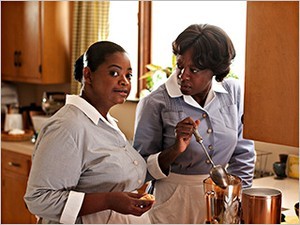
The
second is the story of the maids (the help) who worked in the homes of
the well-to-do in Jackson, Mississippi just a few years before Civil
Rights laws came into effect. It was an intriguing study of American
history, of American culture condensed into two evenings of
storytelling. I recommend it. But I warn you, it’s pretty uncomfortable.
Past
treatment of our Black citizens is part of the American family story
that embarrasses us now. I daresay, many of us good-hearted Christian
people look back and wonder how on earth - in this nation we love -
could so many people have been so blind for so many years. There’s the
first irony: this country of liberty and equality was built on the backs
of slaves. Then a second paradox: there was a brutal deadly war fought
over whether or not to continue the ugly business of slavery. Then for
years after that, “separate but equal” was considered to be an
appropriate and even godly way to order our society.
Thank
goodness our laws have evolved over these 200+ years to reflect a more
just understanding of human relationships in this country. For example,
consider our labor laws (since we are celebrating Labor Day this
weekend). Thank goodness, we finally have laws that protect our
children, protect our health, designate a minimum wage, regulate safety
conditions in the workplace and ensure equal access to the workplace for
women, people of color and people with disabilities.
Thank
goodness our laws have evolved over these 200+ years to reflect a more
authentic actuality of the founding visions of this nation. Even though
the founders did not allow women to vote; even though they allowed
slavery to be part of the DNA of this nation, still they implanted
genius ideals of justice and equality that have enabled this country to
grow and change and become better over the years.
The whole reason
we have laws, I think, is because we don’t have enough love. People
tend to avoid doing the loving, giving thing for others. Authentic love
is counter-cultural in our human cultures, and so societies have always
had to legislate how people should treat one another. Governments must
pass laws in order to make sure we treat each other right and act
appropriately in our various human relationships.
Jesus and the
apostle Paul taught that love is the fulfillment of law. If we would
love our neighbors as ourselves; if we would do unto others as we would
have them do to us, then commandments and statutes wouldn't be
necessary.
But where and when is that going to happen?
An
excellent book written by church historian Dr. Mark Toulouse identifies
four different ways American Christians have, over the years,
intersected faith and politics. There is no one right way to think about
these things.
For example, in the earliest days, a significant
stream of the church was pacifist. But in America during World War One,
preachers across the land, in both liberal and conservative
congregations, pounded their pulpits and insisted it was a “Christian
duty” to enlist and go kill the enemy.
Toulouse looks closely at
the history of the American church’s relationship to its government and
he describes several past and current approaches that are not helpful;
ways that are not at all appropriate for mixing religion and politics.
But
there are some ways he would recommend to Christians and churches as
healthy options, ways that religious influence can appropriately affect
the course of secular governments.
In his explanation, Toulouse describes what he calls “public Christian” and “public church.”
When
Christians truly stand in a public Christian or a public church
orientation to public life, they represent a strand of Christian
understanding and theological concern not primarily rooted in cultural
identities. They don’t speak or act as Republicans or Democrats or even
as Presbyterians or Baptists. They do not speak as Christians who are
primarily concerned with American or denominational politics.
Rather
they speak as Christians who believe in the meaning of the gospel. They
believe that the gospel carries with it implications for how human
beings, in all their individual and social relationships, treat
one another…. Thus when [public Christians] speak or act in public life,
they seek to move it toward a greater realization of … the kind of
justice found in the Hebrew Bible and the Christian gospel.
When
we read Paul’s wisdom to the Roman Christians of the First Century, we
remember that they lived under the whims of capricious emperors and we
recall how Paul himself was persecuted and martyred by his own
government because of his faith. American Christians are fortunate to
live under a Constitution that guarantees our freedom to vote and speak
and protest and express our faith in the public arena.
The public Christian (Toulouse explains) desires to speak about God in public ways that influence how citizens – not just Christians – think about things.
It
was in large part the voices of public Christians and the public church
that worked together with a broad coalition of other activists
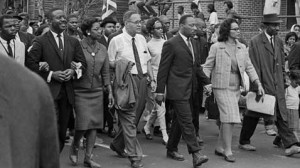
to
abolish slavery, to demand the civil rights of Black citizens, to
influence child labor laws, to advocate for workers’ compensation
protections …and on and on and on. The Christian voice has made a huge
difference in this land that we love. The church’s influence has helped
change our world.
But there is another voice now prominent in the
public conversation of America. What concerns me about this voice is
that it is totally devoid of a concept of the wider social community; it
is completely dismissive of Christ’s demand that we “love our neighbors
as we love ourselves;” that we should do whatever we can to care for
God’s little ones; that we ought to go to some trouble and put ourselves
at risk in order to care for those in God’s beloved flock who may be
lost and struggling.
In this approach, instead of community what
we hear is a voice of insiders protecting their privilege. Instead of
compassion, it is a voice of the powerful shouting down the whispers of
the unemployed and the underemployed - neighbors who want a decent job
and a decent wage and a little respect. Instead of justice and equity,
it is a voice of greed.
In today’s America, where is the authentic Christian voice that will help move our public life
“toward a greater realization of … the kind of justice found in the Hebrew Bible and the Christian gospel?”
Paul’s
Christians did not get to vote or speak out in public against the
abuses of their society. But we live in a democracy that not only
invites - it
demands our participation.
Jeffrey Stout has said:
Democracy
… takes for granted that reasonable people will differ in their
conceptions of piety, in their grounds for hope, in their ultimate
concerns, and in their speculations about salvation. Yet democracy holds
that people who differ on such matters can still exchange reasons with
one another intelligibly, cooperate in crafting political arrangements
that promote justice and decency in their relations with one another,
and do both of these things without compromising their integrity …
Too
much of our current national conversation is mean and divisive. Too
many public people are not engaged in reasonable exchange of ideas or
cooperative efforts. Too many public servants do not seem to be
interested in promoting justice.
Where is the voice of the public prophet calling for love, justice, compassion and mercy?
Who will speak for the “little ones?”
Who will stand up for the vulnerable, the despised and disrespected?
Both
the movies I watched on that marathon weekend give powerful examples of
public Christians and a public church at work in society. The Black
Church in America gives us insight into what it looks like to be “light
and salt” in our society. These brave and bold sisters and brothers
remind us that the public Christian voice
can be a voice of hope and welcome for
all God’s children, for every single American.
Where
did the Black maids go when they had been mistreated by their employers
and their society? They didn’t have legal recourse back then so they
went to church. Those whom the world had beat down, the church held up.
“We
are not wrong,” the Rev Dr Martin Luther King Jr. told God’s ‘little
ones’ gathered at the Holt Street Baptist Church on the evening of
December 5, 1955; because:
…if we are wrong, the
Supreme Court of this nation is wrong. If we are wrong, the Constitution
of the United States is wrong. If we are wrong, God Almighty is wrong.
So let us fight until justice rolls down like waters.
This
Labor Day let us celebrate all those who have worked so hard to make
America strong. But let’s not just wave our flags and mouth our
platitudes. Rather let us be a people who get our hands dirty actually
working for the ideals this flag and this country stand for.
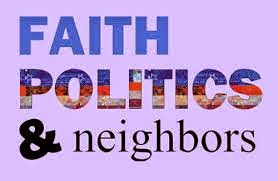
Let
us be bold to raise our voices and challenge our government to keep the
nation’s promise to those who are most vulnerable. Let us recommit
ourselves to advocate on behalf of all those who want to be working
right now but can’t find jobs; all those who have worked hard their
whole life but now find themselves dismissed and disregarded; all those
who do the really important work in our society but find they are
disrespected and undervalued; all those who must work two and three jobs
just to support their families.
Christians are the people of Jesus Christ.
Whose side are we on?
You can blame
Mark Toulouse for starting me on this journey of exploring intersections of faith and politics. I am grateful he was my teacher at
Brite Divinity School and I am grateful he is my friend.
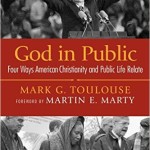
Mark Toulouse,
God in Public: Four Ways American Christianity and Public Life Relate. (Louisville: Westminster John Knox Press, 2006).
Jeffrey Stout,
Democracy and Tradition (2004) quoted in
God in Public, p. 193.
Martin Luther King Jr. sermon
http://academic.udayton.edu/race/02rights/civilrights03.htm


